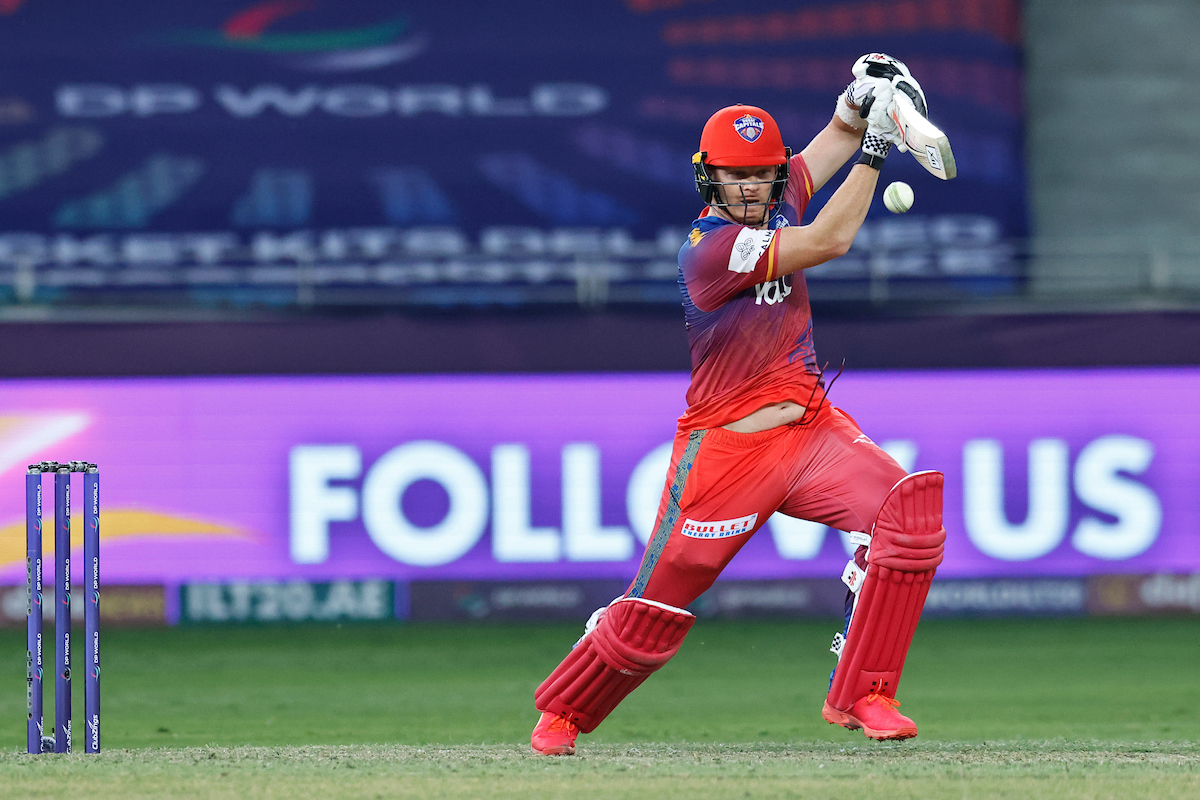Dubai Capitals’ Sam Billings and Sikandar Raza produced a clinical run chase to register a five-wicket win over Abu Dhabi Knight Riders in the eighth match of the DP World ILT20 season 2 at the Dubai International Stadium. Chasing Knight Riders’ impressive total of 183 for 4 in 20 overs, Billings cracked an elegant 67 off 35 balls with nine boundaries and one six, well-backed by Sikandar Raza who scored 43 off 29 balls with five boundaries, to win the match with 23 balls to spare. The pair put on a 109 runs partnership off 59 balls for the fourth wicket.
None expected Dubai Capitals to record such a comfortable win after Knight Riders’ impressive batting show lead by Sam Hain and Laurie Evans. They had put on a 131-run partnership in 78 balls for the fourth wicket. Hain scored 77 runs off 49 balls with eight boundaries and two sixes. Evans hit an unbeaten 67 off 41 balls with six boundaries and two sixes.
Dubai Capitals were faced with the challenge of having to score at a run rate of 9.15. They also lost their skipper and star batsman David Warner to the second ball of the first over for a duck, trapped leg before by David Willey. Opener Rahmanullah Gurbaz too would have gone for a duck had Andre Russell not dropped an easy catch at long-on off Imad Wasim. Jake Fraser-McGurk then hit Wasim for two successive sixes and Willey for consecutive sixes. But Russell ended his innings forcing him to top edge a pull shot for a return catch for 41. Sunil Narine removed Gurbaz edging to wicketkeeper Gous for 21.
Sam Billings and Raza took the score past the 100-run mark in 8.2 overs. By the half way mark, the pair made the target gettable with 64 runs needed to win. Billings reached his half century in 27 balls. He fell at the score of 67 caught by Evans at long-on off Narine. Raza followed seven runs short of his half century, caught and bowled to a leading edge when Capitals needed only four runs to win.
Earlier, Capitals, who had lost their last match to Sharjah Warriors, won the toss and elected to bowl. Knight Riders, who were bowled out for just 95 runs in their previous match by MI Emirates, began on a shaky note through a double strike from Dushmantha Chameera. Andries Gous got clean bowled to Dushmantha Chameera for 4 while one-drop Michael Pepper edged to wicketkeeper Rahmanullah Gurbaz for 4.
Hain went for his shots but opener Alishan Sharafu hit Roelof van der Merwe straight to Sam Billings at mid-wicket for 15 in the seventh over. Laurie Evans and Hain took the score to 75 for 3 by the half way mark. Jason Holder got smashed for 18 runs in in the 13th over with Evans hitting two boundaries and a six off successive balls. Evans reached his half century in 28 balls. Hain too reached his half century in 37 balls. They recorded their 100 runs partnership in 66 balls. Holder ended Hain’s knock with the second ball of the last over forcing him to hit straight to Sikandar Raza at extra over.
Capitals skipper David Warner hailed his boys, stating: “The boys stayed calm. With two set batters, we stuck to our plans and it made things better. My first message to the team was to be brave, express yourself and execute your skills. Have a clear mind and then you win the game comprehensively, like today.”
Knight Riders skipper Sunil Narine said bowling with the dew was tough. “I think we batted well, it was a good total. Picking up early wickets would have been good for us bowling second. Their batters stuck to their plan, and not losing wickets helped them. Bowling second with the dew makes it difficult for spinners. However, we need to execute better.”
Player of the Match, Sam Billings, said that he only maintained the momentum. “I think it is a lot easier when you are ahead of the game, thanks to Fraser-McGurk and Gurbaz. We just had to continue that momentum. Although the toss does play a factor, we played really well. Raza and I were running hard between the wickets, and the lack of dot balls puts pressure on the bowlers.”

 Entertainment4 months ago
Entertainment4 months ago
 Entertainment4 months ago
Entertainment4 months ago
 Entertainment4 months ago
Entertainment4 months ago











